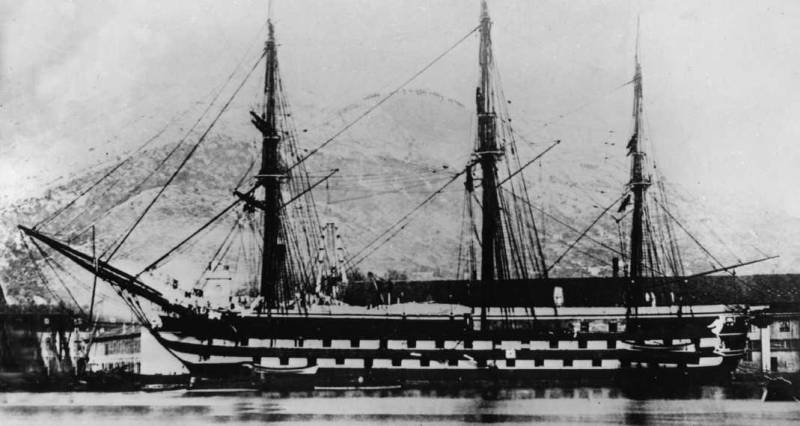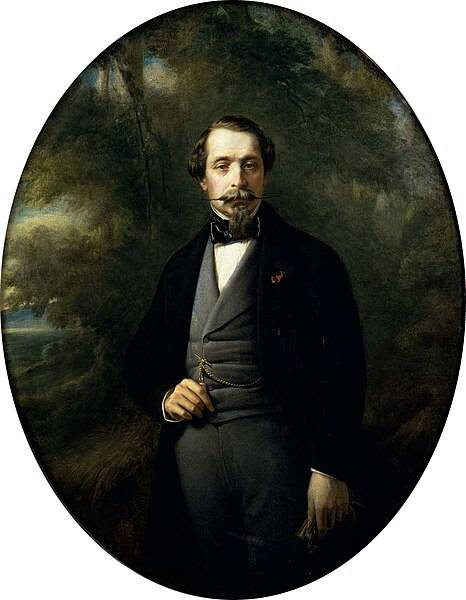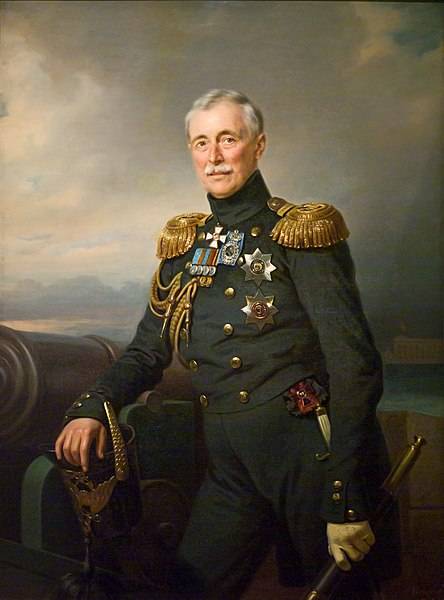How Nikolaev Russia fell into the trap of the Crimean War

French battleship Charlemagne
Russophobia and the Eastern Question
In the pre-war decades, anti-Russian sentiments grew stronger in Western Europe, caused by the desires of Western elites and society to get rid of the “European gendarme.” The West was frightened by the huge Russian Empire, which defeated Napoleon's empire, crushed revolutions and had the largest and most powerful army on the continent. Even Russia's partners in the Holy Alliance, Austria and Hungary, feared Russia's further strengthening.
During this period, the Eastern, Turkish question played a large role in European politics. The Ottoman Empire was greatly degraded and almost collapsed due to the revolution in Greece and the war with Egypt. It was saved only by the intervention of the European great powers, including Russia.
Russian Tsar Nicholas I considered the Ottoman Empire “the sick man of Europe” and was working on the issue of its division ("Türkiye is a dying man"). In particular, he hinted to the British that they could get Egypt if Russia resolved the issue of the security of the Strait Zone and Constantinople. He also did not want France to take advantage of the collapse of Turkey. In January and February 1853, Nicholas again returned to this issue in a conversation with the English ambassador Seymour. He had previously raised it in 1844 at Windsor in a conversation with Peel and Lord Aberdeen. However, this time the British reacted sharply negatively to the issue of the division of Turkey.
As a result, attempts by St. Petersburg to come to an agreement with London on the issue of the future division of Turkey did not interest England. The British did not want to negotiate, they sought global dominance, and Russia was a dangerous potential adversary (How Palmerston beat France and Russia). Therefore, the British set the task of ousting the Russians from the Black and Baltic Seas, returning Russia to the borders of the XNUMXth–XNUMXth centuries.
England was concerned that the Russians might interfere with the creation of their world empire. Russia could intensify its advance in the Caucasus and Turkestan in order to reach the southern seas. Also, the British categorically did not want Russia to receive Constantinople and the Bosphorus and Dardanelles, turning the Black Sea into a “Russian lake” and entering the Mediterranean. Strengthening its position at the expense of Turkey also did not suit Austria. The Viennese court was afraid that St. Petersburg would turn the Balkans into its protectorate.
French society wanted to take revenge for the defeat of Napoleon's empire. In addition, the Russian Tsar had a negative attitude towards revolutions in France. Nikolai Pavlovich considered Napoleon III, who came to power in France after the coup on December 2, 1851, illegitimate, since the Bonaparte dynasty was excluded from the French succession to the throne by the Congress of Vienna. The new French emperor was irritated by the attitude of St. Petersburg. Also, Napoleon III, taking into account the fragility of his position and the internal problems of France, wanted to distract society with a “small victorious war.”

Napoleon III, Emperor of France (1852–1870). Painting by German artist Franz Winterhalter
New aggravation of the Eastern question
At the end of the 1840s, the rivalry between the Orthodox and Catholic churches in Palestine, which belonged to the Porte, sharply intensified. Outwardly, these were petty religious squabbles that regularly occur in and between religious communities. In particular, on the issue of control over the Church of the Nativity in Bethlehem. In questions about who should repair the dome of the Church of the Holy Sepulcher, whether it is possible to place a star with the coat of arms of France in the Church of the Nativity, etc. In general, these were questions at the level of city authorities.
In Palestine it turned out differently. Russia stood up for Orthodox Christians, France stood up for Catholics. The issue has become international. The owner in Palestine was the Turkish Sultan. Among his subjects were about 12 million Orthodox Christians (up to a third of the empire's population) and only a few thousand Catholics. Therefore, it was logical to transfer control over religious objects to the Orthodox Church. Moreover, historically the rights were theirs - before the capture of Palestine by Muslims, it was part of the Byzantine Empire, and not Catholic Rome.
In fact, Paris did not care about any religious symbols and ruins. The issue was Syria, which France wanted to include in its sphere of influence. Therefore, France previously supported the expansion of the Egyptian Pasha Muhammad Ali. In 1830–1847 the French captured Algeria, which was a Turkish vassal, and wanted the banquet to continue. French big capital laid claim to Egypt (here they competed with the British) and Syria and Palestine. Paris also wanted to take revenge for the defeat of Napoleonic France, to split the old anti-French coalition of England, Russia and Austria.
The French cited a 1740 treaty with the Ottoman Empire that gave France control over Christian holy sites in Palestine. Russia pointed to the Sultan's decree of 1757, which restored the rights of the Orthodox Church in Palestine, and the Kuchuk-Kainardzhi Peace Treaty of 1774, which gave Russia the right to protect the interests of Christians in the Ottoman Empire.
France demanded that the keys to the church, then owned by the Orthodox community, be given to the Catholic clergy. Paris backed up its demand with a military demonstration: the French, in violation of the London Convention on the Status of the Straits of 1841, brought the 80-gun battleship Charlemagne under the walls of Constantinople. The Turkish Sultan and the government yielded under pressure from the French. At the beginning of December 1852, the keys to the Church of the Nativity were transferred to France.
In response, Russian Chancellor Nesselrode stated that Russia “will not tolerate the insult received from the Ottoman Empire... vis pacem, para bellum!” The concentration of the Russian army began on the border with Moldova and Wallachia.
In March 1853, the French Foreign Ministry sent instructions to its envoy in Istanbul, de Lacour. It said that if the Russian fleet in Sevastopol begins to move, or Russian troops enter the Danube principalities, or even Russian ships approach the Black Sea coast of Turkey, all this will become the basis for declaring war on Russia. That is, the French prohibited Russians from traveling in the Black Sea!
The aggressiveness of the French regime caused delight in London. The British once again had the opportunity to start a big war in Europe and bleed their competitors. In 1799–1815 England, with the help of the Russians, destroyed the empire of Napoleon, who challenged the world order of Britain. Now it was possible to weaken the strengthened Russian Empire with the hands of France and Turkey.
Menshikov's mission
In February 1853, the Tsarist Ambassador Extraordinary, Prince Alexander Menshikov, arrived in Constantinople on the steamship-frigate “Gromonosets”. The Turkish Sultan Abdulmecid received Menshikov, who presented the Ottoman monarch with a personal letter from Nicholas I. Russia planned to conclude a convention on the position of the Orthodox Church in Palestine and Syria and invited Turkey to conclude a defensive treaty against France. That is, Russia wanted to get an agreement like the Unkar-Iskelesi Treaty of 1833, when the Russians saved Istanbul from its Egyptian vassal (How Muhammad Ali of Egypt defeated and almost dismembered the Ottoman Empire; How Russia Saved Turkey).
The Ottomans maneuvered and played for time. In March, France sent a squadron to the Aegean Sea. On April 5, Stratford-Radcliffe, the new British ambassador, arrived in Istanbul. This was an old enemy of Russia and a personal enemy of the Russian sovereign. He convinced the Ottoman Sultan to satisfy Russia's demands, but only partially - for holy places. The Briton understood that this would not be enough for Menshikov. The Russian ambassador will insist to the end, then England and France will support Turkey. Abdul-Mejid I issued a firman (decree) on the inviolability of the rights of the Greek Church to holy places.
The English ambassador managed to convince Prince Menshikov that England would remain neutral. On May 17, 1853, Menshikov delivered an ultimatum to the Porte demanding the conclusion of a convention on the supervision and control of the immunity of the Greek Church, that is, Russia received the right to intervene in any issues related to the religious and administrative situation of the Orthodox community. Menshikov did not raise the issue of the status of the straits. The Russian side did not receive an answer, and on June 2, 1853, Menshikov left Istanbul.

F. Kruger. Portrait of A. S. Menshikov
Russia has been driven into a trap
Now Russia, in order not to lose face, had to use force.
Tsar Nicholas issued a manifesto that he, like his ancestors, must defend the Orthodox Church in Turkey, and that in order to enforce the previous Russian-Turkish agreements, violated by the Sultan, Russia was forced to occupy the Danube principalities. On June 21, 1853, Russian troops entered Moldova.
This is where Petersburg fell into a trap. Tsar Nicholas hoped that the Russian army and navy would quickly put Turkey in its place. As a last resort, the possibility was considered that France would intervene in the war. However, France did not have a common border with Russia, and it could only help the Porte to a limited extent.
In the pre-war period, the Tsar, including because of the diplomats - Ambassador Kiselev in Paris, Brunnov in London, Meyendorff in Vienna, Budberg in Berlin, and most of all Chancellor Nesselrode, had an erroneous picture of the world. In it, Russia was strong and invincible, Austria and Prussia were allies, England maintained neutrality, France was weak.
Petersburg expected Britain to maintain strict neutrality in the conflict. Austria and Prussia were considered our partners, and from their side Russia was supposed to receive benevolent neutrality. The tsarist government especially counted on the Habsburg Empire, which the Russians literally saved from the Hungarian Revolution of 1849.
The initial mistake in the balance of power in Europe became the main prerequisite for the future defeat of Russia in the Eastern (Crimean) War.
The problem is that the Russian sovereigns Alexander I and Nicholas I paid too much attention to Europe and its problems. Especially help to the German world. They did not understand that no agreements or benefits from Russia in the interests of European countries (for example, saving Vienna and Berlin from Napoleon) would ever make Westerners love Russia or at least respect its interests. Our country has always been “Mordor”, the “evil empire” for the Western world. It has always been too big and strong, and interfered with the West in general and individual Western powers in particular (England).
But there will always be a reason for conflict and an attempt to resolve the “Russian question” - the dismemberment and destruction of Russian civilization. In the XNUMXth century we were accused of being reactionary and absolutist. We were the “gendarme of Europe”.
In the XNUMXth century, the world began to be frightened by the threat of revolution and socialism - “The Russians are coming!”
Currently, Russia is an “aggressor”, “Mordor”, which is encroaching on the freedom of surrounding states. Nobody remembers that the Russian world and the Russian superethnos were simply torn apart in 1991. Now on the agenda is the division and destruction of the remaining part of Russia.
Information